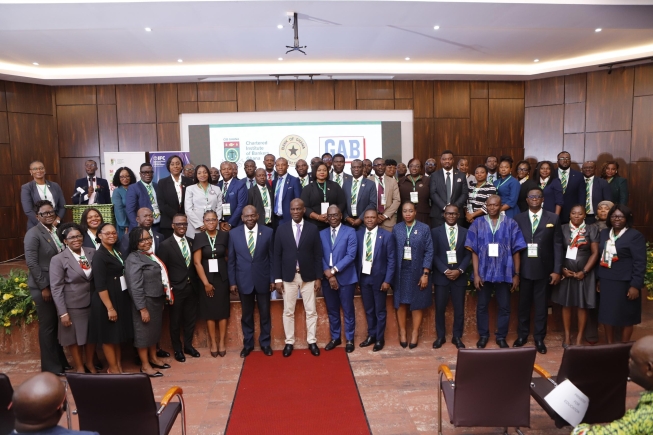The Chartered Institute of Bankers (CIB) Ghana has concluded its 29th National Banking and Ethics Conference in Accra with a renewed call for stronger ethical leadership and professional discipline across the financial sector.
The conference, held under the theme Building Future-Ready Banks: Ethical Leadership, Sustainable Finance, and Currency Stability amid Disruption, brought together regulators, policymakers, and banking executives to reflect on reforms shaping the industry.
The event also saw the formal launch of two new professional programmes — the Ethics 2.0 Programme and the Non-Interest Banking and Finance Certification — designed to deepen competence, integrity, and sustainability within Ghana’s banking profession.
Welcoming participants, the President of CIB Ghana, Mr. Benjamin Amenumey, reaffirmed the Institute’s mandate under Act 991 to promote high standards of professionalism. He emphasised that the health of Ghana’s financial system depends on trust. “Banking is first and foremost a trust profession. Where trust is strong, stability is possible. Where trust is weak, the system is at risk,” he said.
Mr. Amenumey outlined progress made since the revision of the Associate Chartered Banker curriculum, highlighting new leadership and digital banking programmes designed to build a future-ready workforce. He also referenced the Environmental, Social, and Governance Certification Programme developed with the International Finance Corporation and the Environmental Protection Agency to promote responsible finance.
The Chief Executive Officer of CIB Ghana, Mr. Robert Dzato, described the introduction of Ethics 2.0 and the Non-Interest Banking certification as a “defining milestone” in shaping a more ethical banking profession. “The currency in banking is trust. Trust is built through character, competence, and consequence, and that is what we are building in Ghana’s banking workforce,” he stated.
He revealed that more than 9,000 industry professionals had completed the initial Ethics 1.0 Programme developed with the Bank of Ghana (BoG). Ethics 2.0, he said, would extend to all levels of banking staff, including executives and board members. He added that a BoG directive now requires every banking professional to obtain CIB’s ethics certification, while all branch managers must attain the Chartered Banker qualification within five years.
A keynote address delivered on behalf of the Governor of the Bank of Ghana, Dr. Johnson Pandit Asiama, commended the Institute for its leadership in promoting ethical discipline. He cautioned, however, that misconduct and staff-related fraud remain significant threats. “Unethical practices remain widespread, with staff-related fraud on the rise. These issues threaten institutional integrity and underscore the need for stronger ethical frameworks and accountability,” he said. The Governor reaffirmed that ethics certification will form part of the BoG’s fit-and-proper criteria for senior managers and board members.
Speaking as Special Guest of Honour, the Minister for Education, Hon. Haruna Iddrisu, urged the banking industry to resist becoming a conduit for illicit transactions. “Many of the unethical and corrupt monies in this country pass through the banking system,” he said. He called for a fully independent central bank and noted that his ministry was working with CIB Ghana and the National Council for Curriculum and Assessment to integrate financial ethics and literacy into national education frameworks.
The conference featured expert panel sessions that examined ethical leadership, sustainability, digital transformation, and currency stability in the era of virtual assets. Panellists from industry, fintech, and the central bank discussed governance reforms, responsible innovation, cybersecurity, and strategies for balancing digital disruption with monetary stability.
In closing the conference, Mr. Amenumey reminded participants that the gathering was not simply a procedural event but a reaffirmation of shared purpose. “We gather not merely for discussion, but to renew a shared commitment, to build banks that are trusted, to raise leaders who act with integrity, and to shape a financial system that serves Ghana with excellence and honour,” he said.
The 2025 conference underscored CIB Ghana’s leading role in strengthening banking professionalism and charting a path toward ethical, inclusive, and technologically resilient financial institutions.
